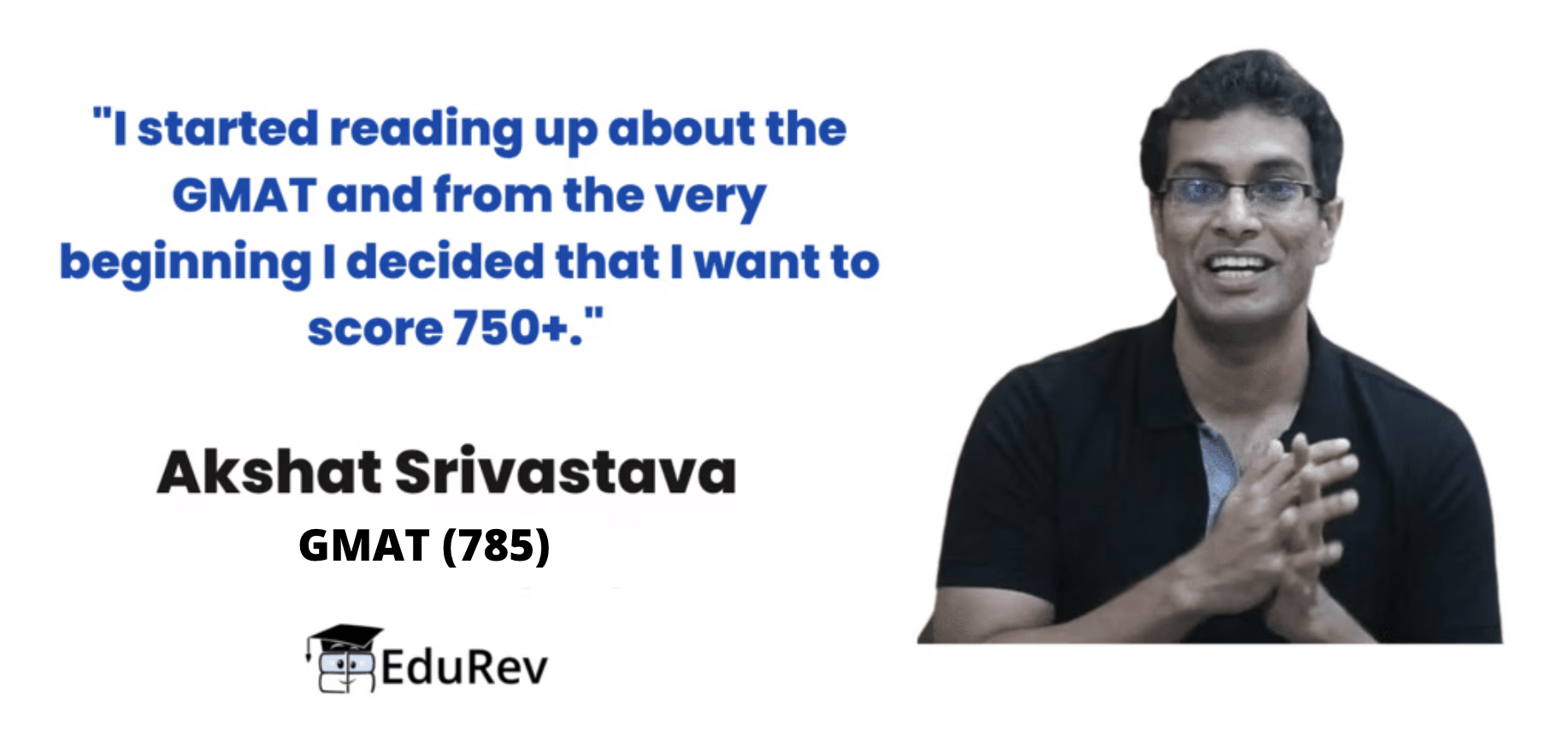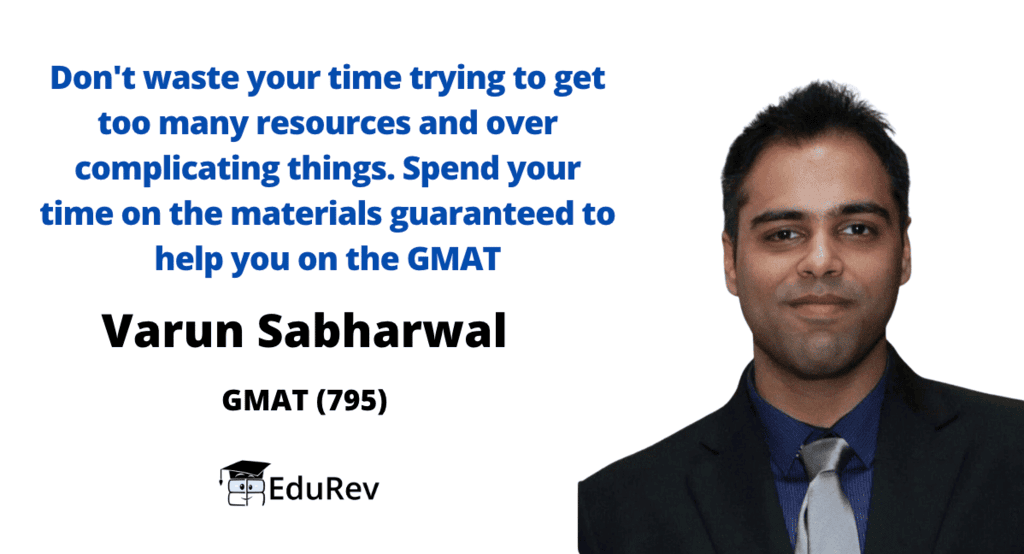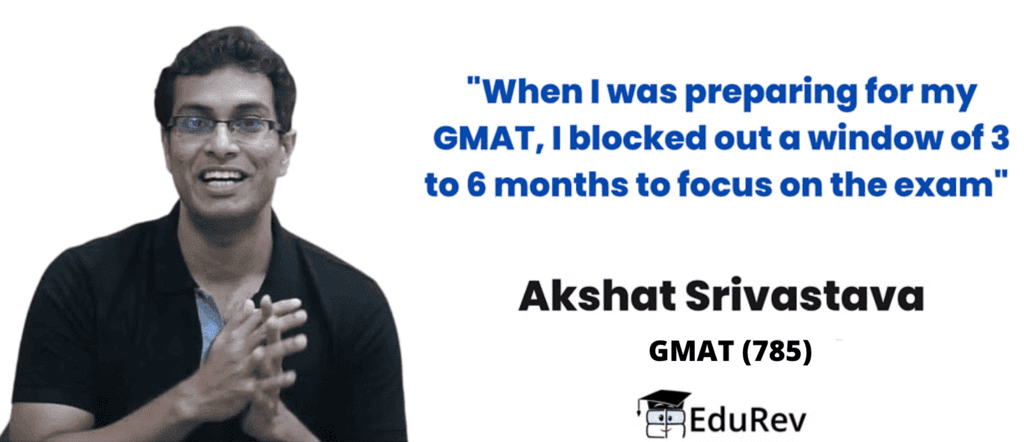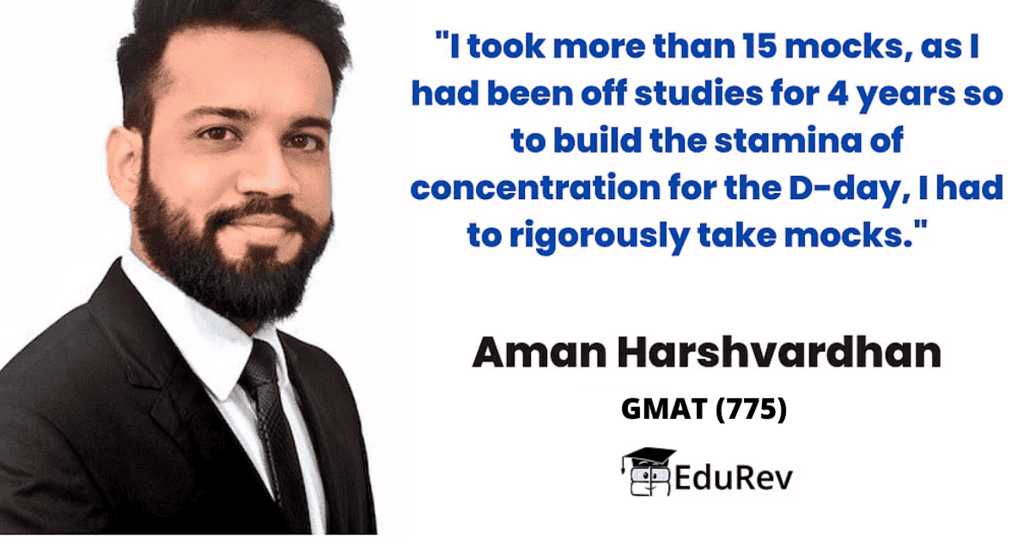GMAT Bible: 8 Steps to Score 720+ in GMAT exam | Quantitative for GMAT PDF Download
GMAT Focus is a standardized test that is used by business schools across the Globe for admissions to their MBA programs. If you are applying for any business-related course, a GMAT exam is super useful from that perspective.

Why MBA?
An MBA truly tells you how to think and behave in a business situation. It gives exposure and self-confidence as you study with students of different calibres and that really elevates your confidence. An MBA program teaches you to assess the significance of various factors from a business standpoint.
How was this guide made?
This guide has been made by EduRev experts by referring to the strategies & interviews of the toppers including Dr. Vikramjit Singh(GMAT: 735), Shlok Gupta(GMAT:715), and Mr. Mukesh Sharma(GMAT :725).
Why did EduRev make this guide?
We wanted to answer the question "How to Prepare for GMAT" once and for all in the best / perfect way possible.
- Since students waste a large amount of time, effort, and money while preparing for GMAT just because of a lack of the right direction. We believe it will be very valuable for every aspirant.
- This guide was made to teach and help students to follow a direction while preparing for the GMAT exam by making sure they Study What Matters. We did the hard work of building the strategy for your GMAT exam so that you can achieve your dream.
Step-by-step Guide to Clear the GMAT exam
Step 0: What to do before you begin your GMAT Preparation?
The best that you as a candidate can do for your preparation is to read this guide and see the different steps to follow the right direction for getting into your dream business school.
- Set goals and devote time effectively: Before starting your preparation for GMAT, it is important to prepare yourself mentally and physically for the examination. Set goals and devote time effectively.
- Analyse and make a plan: Analyse how you would devote time for studies and chart a plan. Today, with technology like the internet, it is possible to balance your life and preparation with ease.
- Make a timetable: To become a business person, it is important to have a schedule and strategy like one. Set proper deadlines, and you would work better and complete the syllabus of the GMAT faster and with better retention.
- Focus on Micro-planning: Planning is as important as studying. Plan how to study that is make daily plans, set weekly targets, and make a broad vision of your entire preparation
- Stay motivated: Lastly, ask yourself why you want to go to your dream school for MBA. This will help you stay motivated.
Step 1: Understanding the syllabus and the exam
- The syllabus of the GMAT exam is the guiding light for you. Knowing the syllabus beforehand is important.
- Understanding dates, timelines, and exam patterns, and being acquainted with the eligibility criteria of the exam will give you a better understanding of the exam. This is critical for you to plan your timelines and strategy for going to your dream business school. To view the complete syllabus and pattern you can click on this link.
- Going through the above points dedicatedly will save a considerable amount of time through your preparation journey for your dream of getting into your choice of MBA school.

Step 2: Understanding Sample Question Papers
- Once you’re through the syllabus, pick up the previously asked questions and skim through them to get an understanding of what is actually asked in the GMAT Exam. You can also analyse what sections are important for you and what are not in your GMAT Syllabus.
- You need to devote 2 to 4 weeks to analyse the syllabus and previous GMAT exams alone, this will help you understand what GMAT is asking and what is the demand.
- Previous Questions are important. You should look for that source that gives topic-wise questions. So that you can have a complete understanding of the topic, and the type of questions asked.
Step 3: Be Consistent with the preparation
- You should stay away from all the distractions for the time period you are preparing for the exam because if your preparation is on and off, it drains out your energy.
- Prepare all sections of the exam daily as it increases the speed and helps you maintain focus on each and every topic.
- You should keep giving at least one mock every week to keep a check on your performance.
- Practice more questions on areas where you feel you lag.

Step 4: Subject-wise preparation strategy for GMAT
- Now that you have understood the syllabus and pattern of the exam, you can divide the preparation plan in a way that more marks are covered strategically.
- For each subject, EduRev has created a structured learning material Based on the previous questions, paper pattern analysis, and pattern explained by the toppers.
- Analyzing your performance will help you understand the areas you're weak in. The analysis feature given below will help you chart your mistakes and work on them.
Step 4.1: How to prepare for Verbal Reasoning
1. Reading Comprehension Tips:
- Read Read Read: Immerse yourself with new words and read as much as you can. Imbibing as many words as you will help you in understanding the difficult words of vocabulary. It does not matter what you read as long as you learn new words, read fast, and have a proper understanding of using different phrases and words. Newspapers and Fictional books are good sources for you to prepare yourself for Reading comprehension in GMAT verbal.
- Don't Worry About Knowing Everything: You don't need to know everything about the passage. Understanding the subject isn't crucial to answer questions.
- Careful Reading Before Questions: Read the passage carefully and analyse it before looking at the questions. Focus on key words and phrases for context.
- Answer Based on Passage Information: Choose an answer that fits with the information provided in the passage. Don't guess based on what you already know.
- Take Your Time: Don't rush through the passages. This section is about understanding, not speed.
2. Critical Reasoning Tips:
- Understand the Question: Figure out exactly what the question is asking. Read the question first, then the material it's based on.
- Pay Attention to Information: Look closely at what is presented as facts, what logically follows, and how well these claims are supported.
- Evaluate Reasoning: Assess how sound the reasoning is when reading arguments. You don't need to decide if everything is true, just evaluate the argument's structure.
- Identify Argument's Conclusion: If a question is about an argument, find out what part of the argument its conclusion is. Focus on understanding the logic presented.
Step 4.2: How to prepare for Quantitative Reasoning?
1. Start with Basics: The main math concepts tested on the GMAT are relatively simple – arithmetic, algebra, geometry – but you probably haven’t studied them since high school. Your GMAT prep will get nowhere if you don’t first review basic concepts in these areas. You must have a clear understanding of Ratios and proportions, Percentages, Exponents, Inequalities, and Coordinate Geometry.
We have created a playlist specifically for you that includes all the topics and a few mock tests, Click here to view it.
2. Regular Practice: Regular practice is the key to success in the quantitative techniques section, as it will increase your speed and improve your accuracy. You should devote at least one to two hours daily to solving questions in Quant.
3. Practise Mock Papers: Once you are done practicing enough questions from each topic of quantitative techniques, then you should attempt previous GMAT sample papers so as to know the pattern of the exam and the type of questions being asked in the examination.
4. Learn Shortcuts: When it comes to mathematics, learning shortcuts to solve questions and calculations becomes extremely important as you will be able to solve the questions much more quickly than before, thereby saving ample time to attempt other sections.
5. Focus on Accuracy: You must ensure that the calculations that you do in the Quant section are accurate because silly mistakes can affect your scores.
Step 4.3: How to prepare for Data Insights?
1. Understand the Question Types: Familiarize yourself with the Integrated Reasoning and Data Sufficiency question types that comprise the Data Insights section. Grasp how to interpret various types of information, including graphics, numerics, and verbal content, to make informed decisions.
2. Develop Digital and Data Literacy: Recognize that the Data Insights section evaluates digital and data literacy, crucial skills in today's business landscape. Enhance your ability to analyze and interpret data digitally, ensuring you are well-versed in navigating information in a digital format.
3. Practice Interpreting Multiple Sources: Given that Data Insights assesses how multiple sources and types of information relate, practice interpreting diverse data sets. Work on questions that involve graphic, numeric, and verbal data to strengthen your ability to draw insights from various formats.
4. Hone Math, Data Analysis, and Verbal Reasoning Skills: Data Insights questions may require a combination of math, data analysis, and verbal reasoning. Sharpen your skills in these areas to effectively tackle the diverse question types within the section.
5. Utilize On-Screen Calculator Effectively: Take advantage of the on-screen calculator provided in the Data Insights section. Practice using it efficiently during your preparation to perform calculations accurately and save time during the actual exam.
You can find all topics of Data Insights here.
Step 5: Practice Practice Practice!

Attempt tests frequently: Don’t plan to first complete all the syllabus and only then give tests. Instead, practice more tests to know where you stand and what areas you need to work upon.
Practice GMAT Focus Edition Mocks here.
Time Management and Speed: Some questions in the GMAT section are peculiar and would take a lot of time. It is important that you set a timer and spend only a particular amount of time on one question
Detailed Analysis After Tests:
- It is important to analyse your topic-wise tests for mistakes and improve accordingly.
- Understand the nature of your mistakes, spot the patterns and work on them
- Work out to eliminate silly errors.
- EduRev helps you to prepare rigorously as we provide you with topic-wise tests to help you retain better.
Step 6: Revise over and over
"Revision is Its own Reward."
- Once you have gained confidence that you can attempt a GMAT examination, review all the material to go through before the exam.
- The final 10 days should be primarily about a review, not about trying to learn a lot of new things. Solidify your strengths. (add review feature)
- What you can fix during the last 10 days are the 3rd and 4th variants.
- Fix for silly mistakes: Make a list of all the careless errors you committed. Before you take the next mocks, pour over them. Taking two extra practice tests in the past ten days will be beneficial. Being aware of the typical stupid errors you frequently commit will undoubtedly help you to prevent them.
- Fix for pacing better: Review the pace chart that each mock exam gives you. Make a list of the questions that took you longer than the typical 2 minutes. Be honest with yourself about your ability to answer a question of this nature in just 2 minutes if you encounter it again.
Step 7: Believe in Yourself
Believe in your infinite potential. Your only limitations are those you set upon yourself.
- Without self-belief, you will not be able to perform well in the exam even if you study a lot.
- Stay positive throughout the journey and march towards your dream.
- It can be beneficial to psychologically be ready for the exam center setting. Some folks even go as far as to check out the testing facility ahead of time.
- In order to get accustomed to the test experience, study images of testing facilities and imagine taking the test. This can be similar to the exposure therapy that people with severe phobias use to lessen their phobias.
- You prepare yourself for the test experience before you actually take it, which lessens the stress you feel during the test.
Step 8: What comes after the exam
- Your GMAT score has a 22% weightage in MBA admissions. You have aced your GMAT Score and have been called in for the interview in your dream B-School.
- The MBA admissions interview is one of the most nerve-wracking aspects of applying to a business school and can make or break your chances of acceptance. Preparation is the key if you want to unlock the door to a successful admissions interview.
- We at EduRev help you create a profile that will help you ACE YOUR MBA INTERVIEW and get into your dream school.
Additional Links:
Syllabus and Pattern of the GMAT Exam
120 Day GMAT Focus Edition Study Plan
40 Days Study Plan for GMAT Data Insights
40 Days Study Plan for GMAT Quantitative Aptitude
40 Days Study Plan for GMAT Verbal Reasoning
|
121 videos|148 docs|111 tests
|
FAQs on GMAT Bible: 8 Steps to Score 720+ in GMAT exam - Quantitative for GMAT
| 1. What is the best way to start preparing for the GMAT exam? |  |
| 2. How important is practicing with sample question papers for GMAT preparation? |  |
| 3. What should be included in a subject-wise preparation strategy for GMAT? |  |
| 4. How can I effectively revise my GMAT preparation materials? |  |
| 5. What should I do after completing the GMAT exam? |  |

















